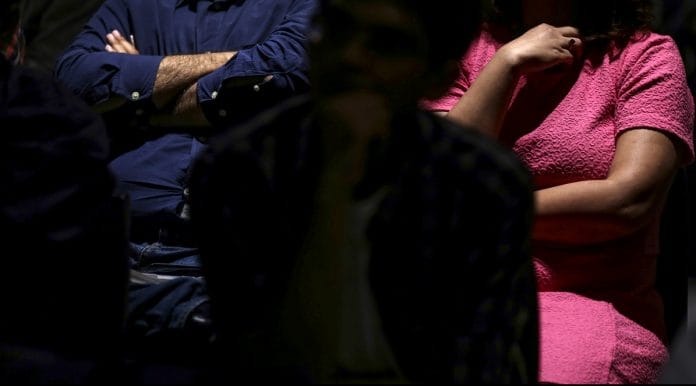Although it seems illogical, many women have defended men accused of sexual misconduct.
The ongoing #MeToo movement has not only revealed a lot about predatory men and the power structures that embolden them, but also about how some women fight for these men. Mallika Akbar’s statement last week defending her husband, former BJP minister M.J. Akbar, is a case in point.
It seems logical to expect women to support women. For many of us, it’s a no-brainer. If a woman comes to us with hurt, we try to mend. We know how cruel people can be, especially men, and we form a protective circle around our own.
Then there’s the matter of women who get flak for what the men in their lives do. These are women who fall prey to the charges of “you probably knew”. These women are painted accomplices and monsters for no fault of their own and take the flak when the men very carefully fade out into the background.
Also read: #MeToo in India should not forgive women who enable patriarchy and rape culture
But more importantly, the one public conversation that #MeToo has engendered is the curious case of why women stand by the men who have been called out for sexual misconduct with multiple screenshots.
These women are angry – not at the men for being abusers and assaulters, but at the women who call them out for their actions. Mallika Akbar put out a statement blaming journalist Pallavi Gogoi, the woman who accused M.J. Akbar of rape, for having destroyed her home. She went on to talk about how her husband eventually prioritised their family and ‘left her’.
Also, take the case of actor-director Nandita Das, who claims to support the #MeToo movement while simultaneously supporting her father’s ‘categorical denial’ of the accusations against him. She even invited Mahmood Farooqui (who was once accused of sexual assault but legally acquitted) to the premiere of her movie Manto in the capital.
Finally, take the case of Manjula Narayan, whose spirited defence of her husband, senior journalist C.P. Surendran, has essentially consisted of deriding the #MeToo movement and attacking the women who spoke up against him.
Also read: Barkha Dutt’s open letter to #MeToo critics Tavleen Singh, Seema Mustafa & Manjeet Kripalani
It’s easy to dismiss these women as ‘tools of patriarchy’ and move on. It’s a phenomenon we’ve seen for decades now – from Hillary Clinton’s reiteration that her husband, then president Bill Clinton, did nothing wrong to the incredible TV series, The Good Wife. Despite their personal disgust, women often stand up for the men in their lives. Their internal worlds may be shattered, but they continue to pull up and maintain a façade of normalcy and defiance in public.
To reduce it to “they’re just conditioned to do this” is a cop-out. It deprives these (often educated, emancipated, and professionally capable) women of their agency and decision-making powers.
I have a few theories about why women, like the ones mentioned here, do what they do.
The first is simple denial. It’s hard to reconcile the fact that the people who are very good to you are possibly terrible to someone else, especially when these people are known for their perceived brilliance. We have been taught that ‘good’ and ‘talented’ are often synonymous. We allow for talent to justify so much harm. May be these women do that too.
The second is self-preservation. As unfortunate and disgusting as it is, the impact of a man’s fall from grace leaves him bruised, but it crushes the women in his life. They have to contend with their own grief, that of others, and the miasma of anger looking for some outlet. In such cases, women with high-profile careers, who have built their image to be the woman who ‘has it all’, simply work in ways that protect them. If they don’t get into the gnarly bits of having to deal with the fact that their perfect life isn’t really all that perfect, may be they can ride through the wave.
Also read: It was consensual: Akbar denies rape charge, wife says US journalist Pallavi Gogoi is lying
The third is the complexities of maintaining the relationship. Marriage, especially in India, is loaded with the kind of social significance few other relationships are accorded. For women, it often becomes a turning point where their identities are subsumed into larger structures. You have children, and you have the social life you built as women. May be it’s a perspective that a young, single woman like me lack. May be there’s something that trumps even the beliefs you hold close.
Finally, I think it’s love. We love people. But to like someone is not a precondition to loving them. To love someone can be painful in its contradictions, in its paradoxes, and it can be cruel in its ironies. Love is a difficult spell to break – wars have been fought for less. May be that’s what it boils down to. Maybe when you love someone you fight the world for them even when you can’t forgive them, and burn yourself out in return.
The author is a poet.







A complex set of emotions must go through the mind of a woman in such a situation. The men mentioned in this column are incorrigible, serial adulterers / predators. No one would be better aware of their proclivities than their long suffering wives. To stay on in such a marriage, for a variety of reasons, is a personal choice. It then becomes a wife’s duty to offer emotional support to her husband, tell him the storms that rage are outside the four walls of our home, within them, the children and I are with you. However, one is not sure if that wifely dharma extends to telling a victim of rape, You are lying; it was consensual. And, of course, the world does not believe the wives, not one bit.